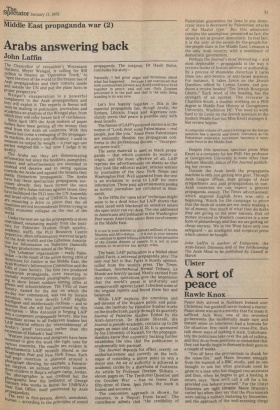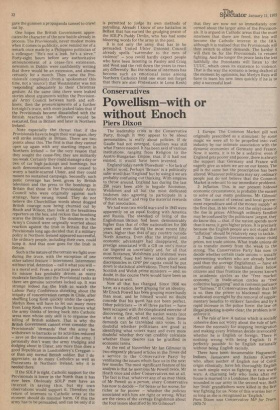Ulster
A sort of peace
Rawle Knox
Peace duly arrived in Northern Ireland over Christmas, but goodwill never looked a starter. Peace alone was such a novelty that for many it sufficed. Jack Weir, one of the reverend go-betweens (he incidentally made rare and instant sense on television) had a formula for the situation: first catch your cease-fire, then talk about ways of making it stick. Unfortunately the politicians take over the job of talking, and they do so from positions so embattled that they can hardly begin to dismantle their guns in a couple of weeks.
"You all have the provisionals to thank for the cease-fire," said Maire Drumm smuggly from the warmth of a BBC studio, and no one thought to ask her what gratitude need be given to a man who has slugged you unawares and then, when he begins to get a basting in return, says: "Now we'll call it off for a bit, provided you behave yourself." For the Ulster Unionists are right (despite Maire Drumm's curled hp) when they say that the Provisionals were taking a military battering by November, and the approach of the well-meaning clergy gave the gunmen a propaganda tunnel to crawl out by.
One hopes the British Government appreciates the character of the new battle already in process. The Provisionals, never modest moles when it comes to publicity, now remind me of a remark once made by a Philippino politician of a colleague: "He's not a leak, he's a sieve." Forty-eight hours before any authoritative announcement of a cease-fire extension, newsmen in Dublin were confidently writing that there would be an extension, and almost certainly for a month. Then came the Provisionals' complaints (from a 'spokesman' this time, not a 'source') that Westminster was not 'responding' adequately to their Christmas gesture. At the same time there were leaked stories about arguments within the Provisionals' Army Council between hardand softliners; then the pronunciamento of a further fortnight's truce, with more leaked tales that if the Provisionals became dissatisfied with the British reaction the 'offences' would be restarted, first in Britain and later in Northern Ireland.
Note especially the threat that if the Provisionals have to begin their war again, they will strike initially in Britain. There are two points about this. The first is that they cannot open up again with any startling impact in Northern Ireland — for the very reason that they sought the cease-fire; they are militarily too weak. Certainly they could manage a day or two of car high-jackings and bombings, but such demonstrations have almost ceased to worry a battle-scarred Ulster, and they could mount no sustained campaign. Secondly, such panic coverage has been given by British television and the press to the bombings in Britain that those in the Provisionals' Army Council who were originally against such strategy, have swung round. They do not believe the Churchillian words about dogged British courage now being churned out by Heath and Wilson; they look at the breathless reporters on the box, and reckon that bombing scares the British wooly. The doubters in the Army's Council were originally worried about reaction against the Irish in Britain. But the Provisionals long ago decided that if a military policy in Northern Ireland appeared successful, the ordinary people, including their own, could lump it. And that now goes for the Irish in Britain.
Such is the nature of the terrain we fight over during the truce, with the exception of one other salient feature — internment. Internment without trial, detention — call it what you will — is a moral evil. From a practical point of view, its misuse has probably driven as many moderate families into the Provisional ranks as there are genuine terrorists locked up. It was strange indeed for the Irish to watch the Labour Party Conference shrieking about the iniquity of concentration camps in Chile, after shuffling Long Kesh quickly under the carpet. Merlyn Rees will have to let out many more from Long Kesh, even though he knows what the army thinks of letting back into Catholic areas men whose only skill is to organise the killing of British soldiers. That is why the British Government cannot even consider the Provisionals' demands' that the army be withdrawn to barracks or its activities reduced — save on the recommendation of the army. I personally don't want the army trudging and dodging about in Ulster, any more than does a good Republican in Londonderry's Creggan — or than any normal British soldier. But I do appreciate, as do many Catholics as well as Protestants in Northern Ireland, why it is needed there.
If the SDLP is right, Catholic support for the Provisionals is lower in the North than it has ever been. Obviously SDLP men have an interest in saying this, but my own observations would support it. Therefore the return of internees to Catholic areas at the moment should do minimal harm. Of this the army has to be persuaded, and can be only if it is permitted to judge its own methods of oatrolling. Already I know of one battalion in Belfast that has earned the grudging praise of the SDLP's Paddy Devlin, who has had some blistering words for the army in the past.
It is not only the army that has to be persuaded. United Ulster Unionist Council already spells "surrender to the men of violence" — you could hardly expect people who have been listening to Paisley and Craig and West and the rest down the years to react any differently. But the release of internees has become such an emotional issue among Northern Catholics (and one must not forget that there are also Protestants in Long Kesh) that they are now not so immediately concerned about the larger aims of the Provisionals. It is argued in Catholic areas that the more internees that there are freed, the less will become the Catholic interest in the IRA, although it is realised that the Provisionals will then switch to other demands. The harder it will then be for the Provisionals to resume fighting. And the longer the peace lasts the less faithfully the Potestants will listen to the UUUC, which owes its existence to violence. That is the way the scenario is being drafted at the moment by optimists, but Merlyn Rees will have to learn his new lines quickly if he is to play a successful lead.



























 Previous page
Previous page